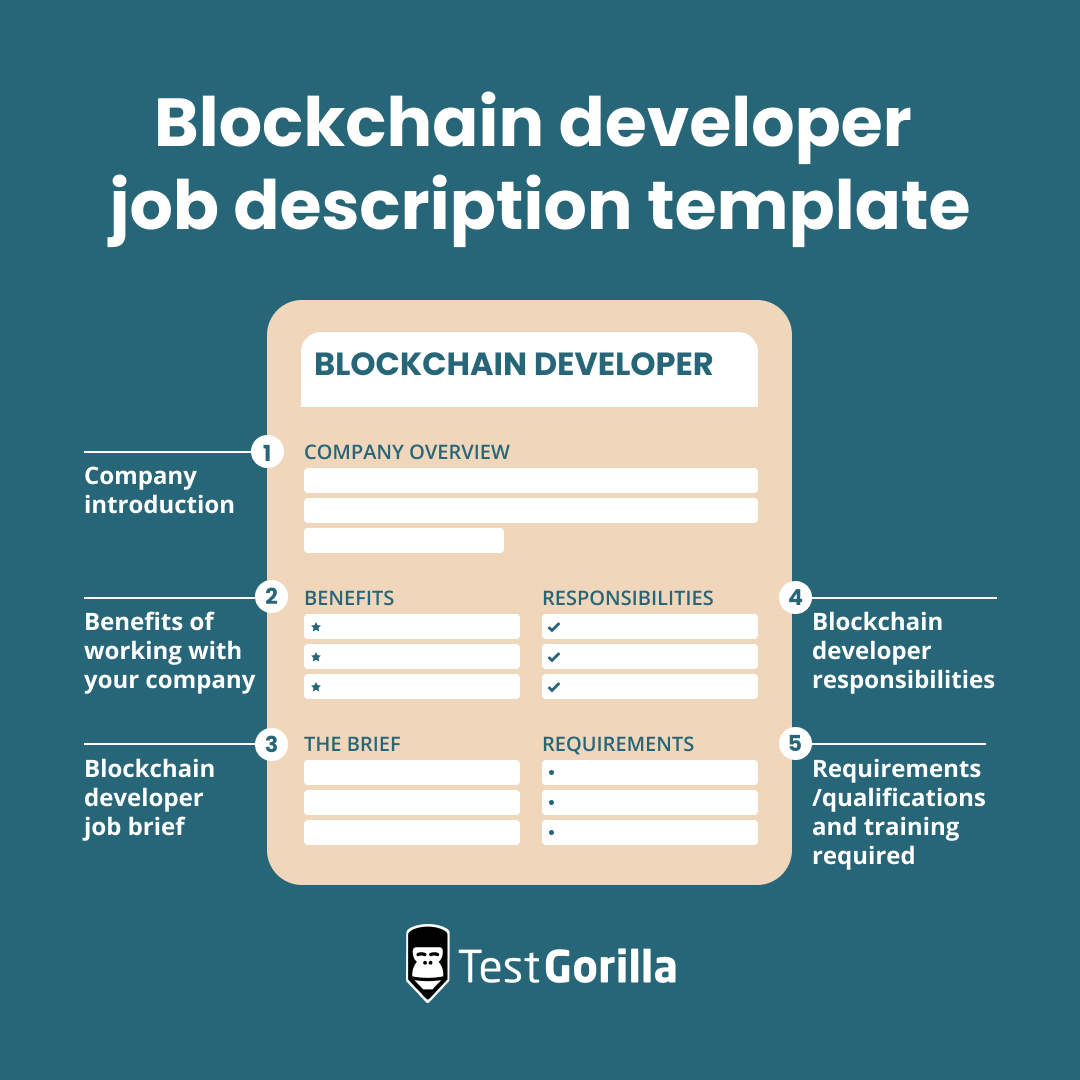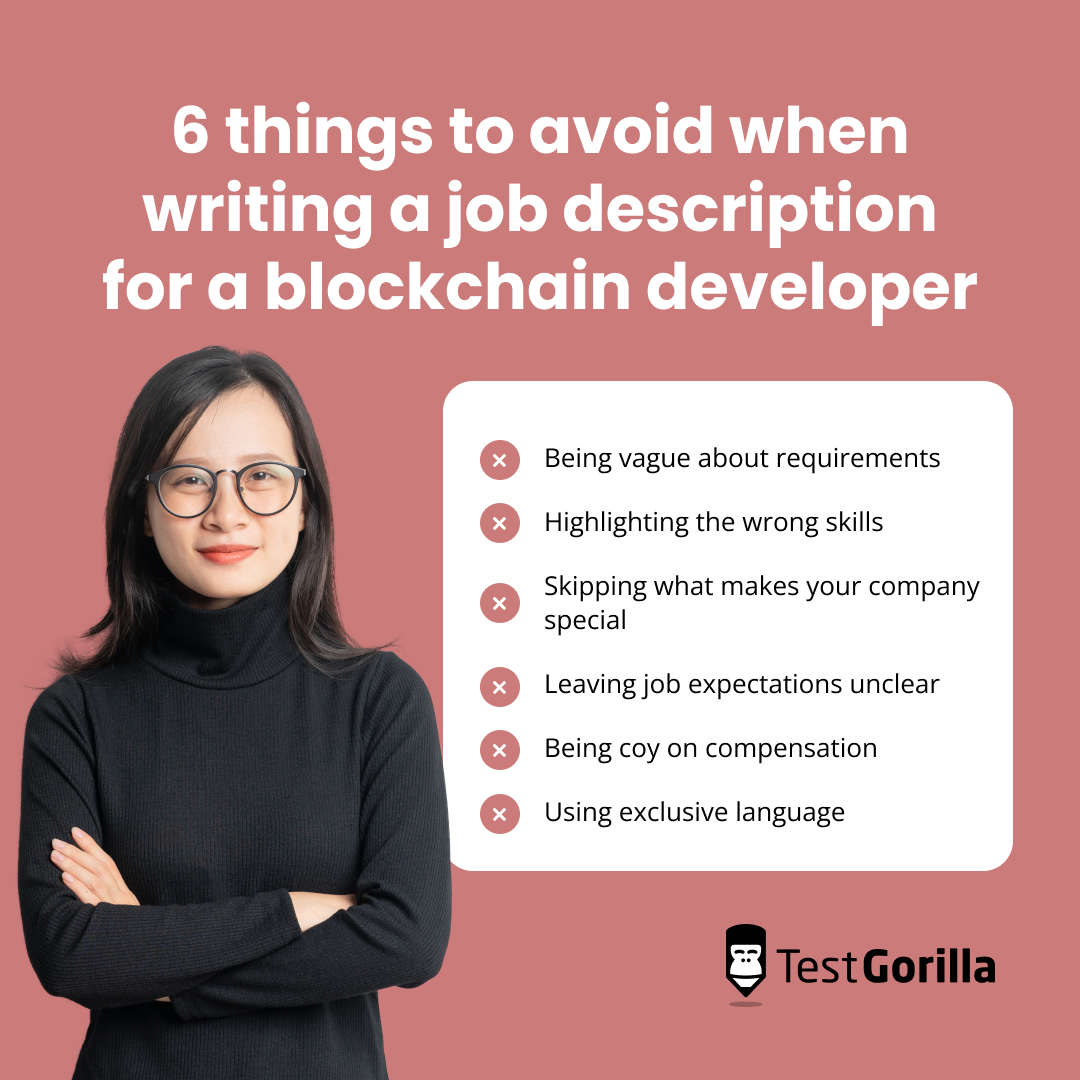Blockchain technology is rapidly transforming various industries, and the demand for blockchain developers is rising. However, finding the right candidate for the job can be challenging, especially if you don't have a clear job description. And hiring the wrong person can result in costly mistakes, missed opportunities, and project delays.
To attract the right candidates, it's crucial to write a comprehensive job description that clearly outlines the key requirements, responsibilities, and skills needed for the role.
Need help? We’ve got you covered.
In this article, we discuss the best practices for writing a blockchain developer job description that attracts top talent. We cover the role of a blockchain developer, key skills and qualifications to look for, and common pitfalls to avoid. We also share a template to get you started.
Table of contents
- What is a blockchain developer?
- Key skills to look for in a blockchain developer
- How to write an effective blockchain developer job description
- Blockchain developer job description template
- 6 things to avoid when writing a job description for a blockchain developer
- Next steps: Attracting and assessing blockchain developer candidates
- Blockchain developer job description FAQs
- Hire top blockchain developers with TestGorilla
What is a blockchain developer?
Blockchain developers are software developers who focus on blockchain technology, which is a digital ledger of transactions that is secure, transparent, and tamper-proof. They build, maintain, and design blockchain applications and systems, such as digital currencies, smart contracts, and distributed applications.
Blockchain developers ensure that records are both visible and unchangeable, making it tough for anyone to commit fraud. This adds an extra layer of trust and efficiency to transactions that require high security and transparency, like financial exchanges or supply tracking.
Key skills to look for in a blockchain developer
Identifying candidates with a balance of these skills will set a strong foundation for your blockchain projects:
Solid grasp of blockchain basics: Understands basics like cryptography, agreement methods, blockchain rules, data safety techniques, and various ways to structure data
Skilled in coding languages: Is familiar with languages like Solidity, Java, or Python
Hands-on experience with smart contracts and decentralized apps (dApps): Can handle both the user interface and the technical backbone of dApps and set the rules that run them
Understanding of DevOps: Knows how to manage code, engage in code assessments, and create secure, efficient software
Sharp analytical and problem-solving abilities: Can use critical thinking to root out bugs in software
Effective communication and teamwork: Communicates well with others and knows when to ask for guidance
Keeps up with new tech trends: Stays informed about the latest progress in the blockchain sector
The best insights on HR and recruitment, delivered to your inbox.
Biweekly updates. No spam. Unsubscribe any time.
How to write an effective blockchain developer job description
Writing a compelling and effective description that’s capable of attracting top candidates requires you to think about a few things:
Understand blockchain technology
You must understand the core technical aspects of blockchain development if you’re going to write an effective job description. Familiarize yourself with terms like smart contracts, decentralized applications (dApps), and cryptographic algorithms. Understanding these concepts helps you to articulate the technical requirements in the job description, ensuring you're on the same page with potential candidates.
101 Blockchains’ Blockchain Fundamentals is a short course that can help bring you up to speed if you’re new to blockchain tech.
Specify the blockchain platform
Blockchain platforms vary with different capabilities and languages. Specify whether you require experience in platforms like Ethereum, Hyperledger, or Binance Smart Chain. This narrows the pool down to developers familiar with the platform you’re working on, ensuring they can hit the ground running.
Look for security expertise
Security is a major concern in blockchain projects. Highlight the importance of security expertise in your job description. Look for candidates with a solid understanding of cryptographic principles and experience securing blockchain-based applications against threats.
Blockchain developer job description template
Use this template as a basis for your job description. Modify it as needed.
Company introduction
In this section, provide a brief overview of your company. Mention which industry you're in, the company's mission, and the work culture. Highlight any achievements or milestones that set your company apart from others.
Clarify how the blockchain developer role contributes to your projects. Illustrate which projects they'll be working on and how blockchain technology is used in your operations. This gives candidates a sense of the real-world impact they can make, drawing in those passionate about the practical applications of blockchain technology.
Benefits of working with [your company]
Here, list the perks of joining your team. These could be professional development opportunities, a friendly work environment, a competitive salary, or unique benefits like remote work options.
The blockchain sphere is rapidly evolving. Emphasize the importance of continuous learning and staying updated with the latest blockchain technologies and best practices. This shows that you value adaptability and are looking for candidates committed to growing with the technological advancements in the blockchain domain.
Blockchain developer job brief
[Company name]
Job Title: [For example, Junior Blockchain Developer, or Smart Contract Developer]
Reports to: [For instance, Blockchain Development Team Lead]
Position type: [Full-time, part-time, on-site, remote, or hybrid]
[Compensation details]
Blockchain developer responsibilities
Develop and maintain blockchain protocols, smart contracts, and cryptography algorithms.
Collaborate with cross-functional teams to integrate blockchain technology with existing company software.
Conduct research to determine the best blockchain technologies for specific company needs.
Ensure the security and performance optimization of blockchain applications.
[Other responsibilities based on your specific needs]
Blockchain developer requirements/qualifications and training required
Bachelor’s/master’s degree in computer science, information technology, or a related field (or equivalent experience)
Strong understanding of blockchain technology and smart-contract languages like Solidity
Experience with development tools such as Git, Node.js, and Truffle
Familiarity with cryptography and data structures
[Other qualifications based on your specific needs]
6 things to avoid when writing a job description for a blockchain developer
When writing a job description for a blockchain developer, avoid these six common mistakes – which can reduce the number and quality of the applicants you attract.
1. Being vague about requirements
Don't use broad terms like "good with Blockchain" or "Bitcoin expert." Zero in on the blockchain skills and experience you need. For example, specify if you're looking for someone with expertise in Ethereum smart contracts.
2. Highlighting the wrong skills
It's good to want a well-rounded person, but focus on what's crucial for the role. Understanding cryptography and smart contracts often matters more than being savvy with general web development, for instance.
3. Skipping what makes your company special
In a job market where people have options, you must show why your company is different. Mention your work culture, workplace flexibility, and any cool projects or tech the new hire might work on.
4. Leaving job expectations unclear
Help candidates easily understand the role by outlining responsibilities and tasks. Be specific about what you expect and any growth opportunities available.
5. Being coy on compensation
Blockchain developers are hot commodities. Be upfront about salary and benefits to attract the best. Include information on pay range and any extra perks, like employee resource groups or learning stipends.
6. Using exclusive language
Use inclusive language to ensure your description meets all employment and anti-discrimination laws, support fair hiring, and encourage diverse applicants. For example, saying you want “a rockstar blockchain developer who knows his stuff ” can exclude all female applicants, as well as any other applicants who don’t see themselves as rockstars.
Next steps: Attracting and assessing blockchain developer candidates
Once you’ve written your job description, Post it on various platforms, including job boards, social media, and professional networking sites to maximize its reach. You might also post on blockchain communities and forums to tap into more professionals passionate about this field.
After you’ve gathered a pool of applicants, you must assess their technical and soft skills. Consider using TestGorilla’s pre-employment assessments.
To fully understand each candidate, combine multiple assessments. Start with TestGorilla's Blockchain Software Development and Smart Contracts tests, for example. These tests can evaluate the key skills for this role. We recommend combining these tests with personality and cognitive aptitude tests for a well-rounded look at your candidates.
For more step-by-step guidance, read our article on how to hire a blockchain developer.
Blockchain developer job description FAQs
What salary range should I include in my job description?
According to Glassdoor, blockchain developers in the US earn between $81,000 and $134,000 per year. Make your salary competitive – equal to or better than the average – to attract top talent.
Where should I post my job description?
Post your job description on your company website and online job boards, including specialized ones like Crypto Recruit where more blockchain developers will see it.
Hire top blockchain developers with TestGorilla
You've learned the nuts and bolts of creating an effective blockchain developer job description. It's a balance: be specific but not limiting – comprehensive yet concise.
Now, how do you make sure you hire the right blockchain developer for the role? This is where TestGorilla can be invaluable. Our platform offers specialized tests for blockchain development and smart contracts, plus various other tests – ensuring that you screen for both hard and soft skills effectively.
Ready to give it a try? Sign up for a free account today.
You've scrolled this far
Why not try TestGorilla for free, and see what happens when you put skills first.
















